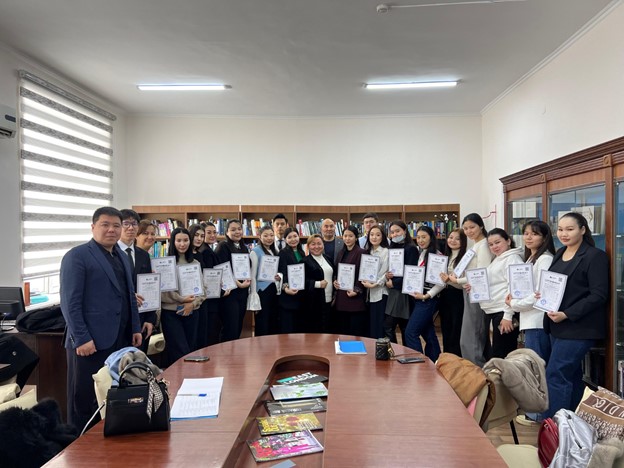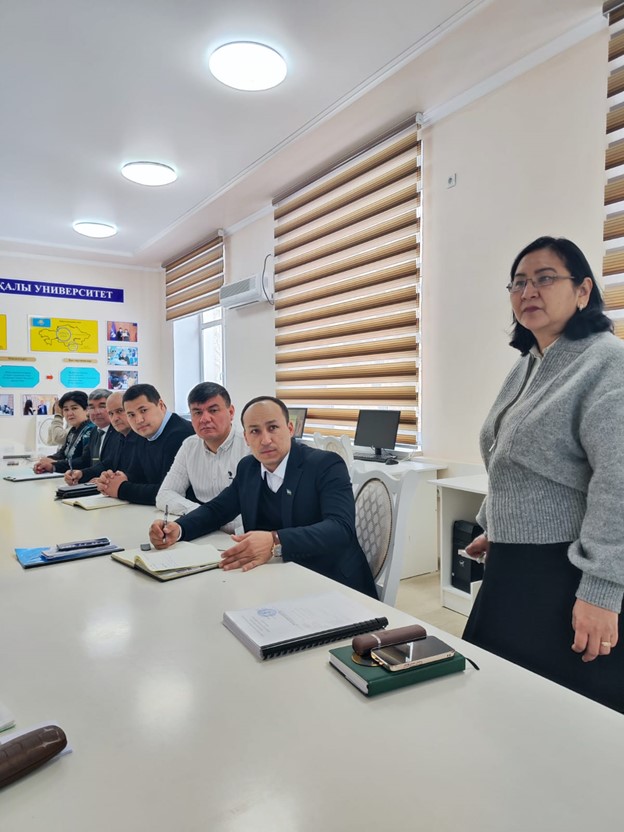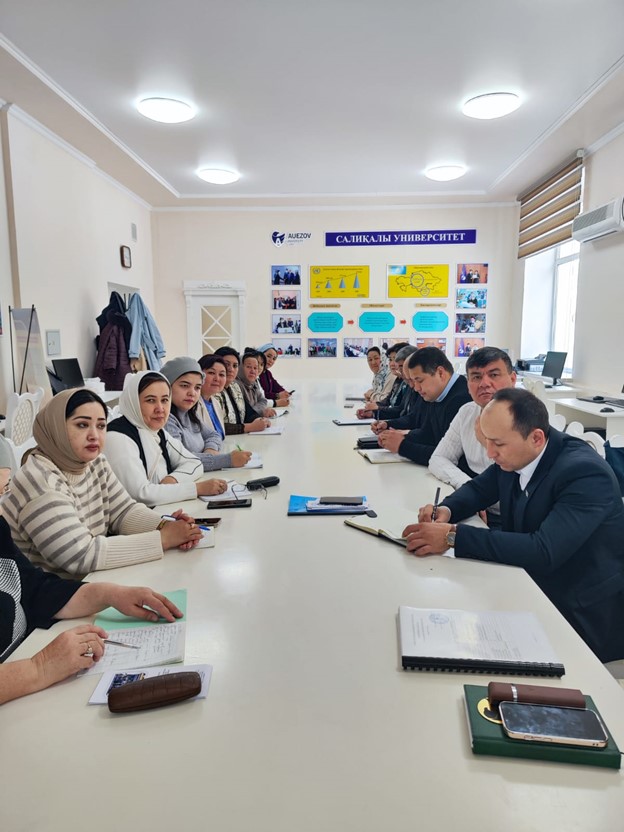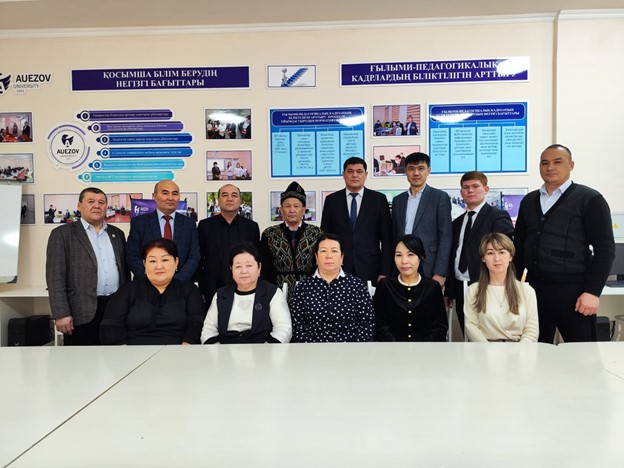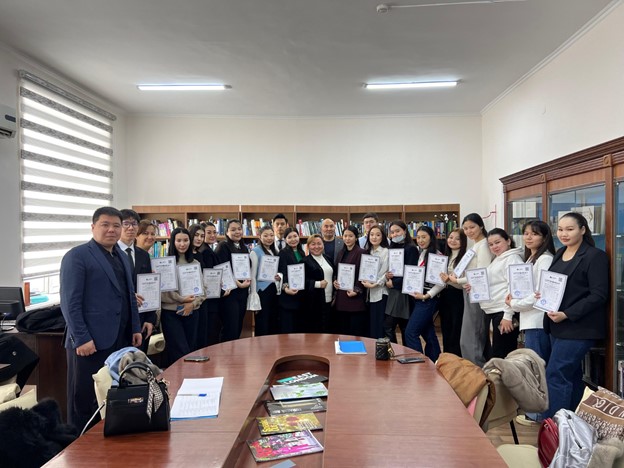News
LIFELONG LEARNING AS A DRIVER OF CAREER DEVELOPMENT
- Hits: 292
The concept of lifelong learning feels natural and relevant in today's world. With the rapid development of digital technologies and information systems, continuing education is no longer a luxury - it has become a necessity. It offers new opportunities for personal and professional growth and encourages individuals to become active members of society. At the M. Auezov South Kazakhstan University, the Centre for Continuing Education is fully engaged in this direction. Its senior specialist, G. S. Myrzatayeva, gives insights into the centre's growing activities.
Adapting to the realities of modern society and the changing environment is a demand of our time. In the digital age, the ability to meet society's expectations and remain a competent, up-to-date professional has become a central goal for many. Today's lifelong learning system is based on a number of key principles: it strives to make learning accessible to citizens of all ages, regardless of background or stage of life; it ensures a smooth transition between different levels of education; it offers distance and online formats that meet people's individual needs; and it aligns its programmes with labour market needs and global standards. In recent years, this approach has become a major focus of Kazakhstan's education policy. Lifelong learning begins in early childhood education, continues through school, college or university, and extends to postgraduate study, professional development and retraining opportunities in various fields.
Based on these principles, the Centre for Continuing Education has established a solid and well-organised system of educational programmes. It offers professional development courses for university teachers, implements the "Silver University" initiative, and runs teacher retraining programmes as well as paid courses open to the general public. This academic year, the teacher retraining programme was conducted in two phases. In the first, 39 participants completed training in eight subject areas; in the second, 19 participants continued their studies in seven different areas.
Professional development programmes are regularly offered at the university. These cover a variety of teaching formats and are designed to enhance the professional competencies of faculty members. Among the centre's many offerings, the Modern Teaching Technologies course has proved particularly popular. This programme equips lecturers with practical tools and relevant knowledge for today's classroom demands. In the first round of the course this year, 70 participants successfully completed their training.
To further support the development of teachers who teach in English, a specialised course on Content and Language Integrated Learning (CLIL) has been launched. 16 teachers have participated in this programme. The course covers a number of modules, including the use of the CLIL approach in trilingual education, integrated learning as an outcomes-based model, and methods for teaching core academic subjects in English.
The university has also made digital literacy a priority. In an effort to improve the quality of education and support the development of future professionals, the centre has introduced a course entitled "Digital Literacy and Online Teaching Methodology". This course provides teachers with training on key topics such as navigating and configuring the ISVUZ system, preparing syllabuses, managing grades and attendance, validating exam questions and using the SMART platform. So far, 130 teachers have completed this programme during the current academic year.
Another successful initiative is the University's course on Inclusive Education in Higher Education. Last year, 242 lecturers participated in this course, and a further 159 have completed it so far this year.
Since 2021, the University has been implementing the "Salikaly University" project as part of its third strategic mission. This initiative supports the creative and professional development of the older generation and encourages their involvement in meaningful work. Over the past few years, 46 retirees have participated in training programmes such as "Digital Curator" and "Gardener". The Gardener course teaches participants how to take care of houseplants, fruit and ornamental trees, and seasonal gardening tasks. Meanwhile, the Digital Curator course introduces students to practical computer applications, internet tools, network systems, e-government services and online platforms. It also gives them an overview of the University's infrastructure, which has evolved over more than 80 years. This year, 18 people have completed the Digital Curator course.
International collaboration remains an important part of the Centre's work. A total of 109 teachers from higher education institutions across Uzbekistan have completed professional development programmes offered by the University. These institutions include Andijan Mechanical Engineering Institute, Karshi Engineering and Economic Institute, Karakalpak Institute of Agriculture and Agrotechnologies, Fergana State University, Tashkent Nizami State Pedagogical University, Namangan State Pedagogical Institute, Tashkent State Transport University, Tashkent Chemical-Technological Institute, and others.
In addition to these efforts, 186 participants from universities, colleges, educational organisations and industrial enterprises have completed paid professional development courses offered by the Centre for Continuing Education.
Adapting to the realities of modern society and the changing environment is a demand of our time. In the digital age, the ability to meet society's expectations and remain a competent, up-to-date professional has become a central goal for many. Today's lifelong learning system is based on a number of key principles: it strives to make learning accessible to citizens of all ages, regardless of background or stage of life; it ensures a smooth transition between different levels of education; it offers distance and online formats that meet people's individual needs; and it aligns its programmes with labour market needs and global standards. In recent years, this approach has become a major focus of Kazakhstan's education policy. Lifelong learning begins in early childhood education, continues through school, college or university, and extends to postgraduate study, professional development and retraining opportunities in various fields.
Based on these principles, the Centre for Continuing Education has established a solid and well-organised system of educational programmes. It offers professional development courses for university teachers, implements the "Silver University" initiative, and runs teacher retraining programmes as well as paid courses open to the general public. This academic year, the teacher retraining programme was conducted in two phases. In the first, 39 participants completed training in eight subject areas; in the second, 19 participants continued their studies in seven different areas.
Professional development programmes are regularly offered at the university. These cover a variety of teaching formats and are designed to enhance the professional competencies of faculty members. Among the centre's many offerings, the Modern Teaching Technologies course has proved particularly popular. This programme equips lecturers with practical tools and relevant knowledge for today's classroom demands. In the first round of the course this year, 70 participants successfully completed their training.
To further support the development of teachers who teach in English, a specialised course on Content and Language Integrated Learning (CLIL) has been launched. 16 teachers have participated in this programme. The course covers a number of modules, including the use of the CLIL approach in trilingual education, integrated learning as an outcomes-based model, and methods for teaching core academic subjects in English.
The university has also made digital literacy a priority. In an effort to improve the quality of education and support the development of future professionals, the centre has introduced a course entitled "Digital Literacy and Online Teaching Methodology". This course provides teachers with training on key topics such as navigating and configuring the ISVUZ system, preparing syllabuses, managing grades and attendance, validating exam questions and using the SMART platform. So far, 130 teachers have completed this programme during the current academic year.
Another successful initiative is the University's course on Inclusive Education in Higher Education. Last year, 242 lecturers participated in this course, and a further 159 have completed it so far this year.
Since 2021, the University has been implementing the "Salikaly University" project as part of its third strategic mission. This initiative supports the creative and professional development of the older generation and encourages their involvement in meaningful work. Over the past few years, 46 retirees have participated in training programmes such as "Digital Curator" and "Gardener". The Gardener course teaches participants how to take care of houseplants, fruit and ornamental trees, and seasonal gardening tasks. Meanwhile, the Digital Curator course introduces students to practical computer applications, internet tools, network systems, e-government services and online platforms. It also gives them an overview of the University's infrastructure, which has evolved over more than 80 years. This year, 18 people have completed the Digital Curator course.
International collaboration remains an important part of the Centre's work. A total of 109 teachers from higher education institutions across Uzbekistan have completed professional development programmes offered by the University. These institutions include Andijan Mechanical Engineering Institute, Karshi Engineering and Economic Institute, Karakalpak Institute of Agriculture and Agrotechnologies, Fergana State University, Tashkent Nizami State Pedagogical University, Namangan State Pedagogical Institute, Tashkent State Transport University, Tashkent Chemical-Technological Institute, and others.
In addition to these efforts, 186 participants from universities, colleges, educational organisations and industrial enterprises have completed paid professional development courses offered by the Centre for Continuing Education.
Found a typo? Please select it and press Ctrl + Enter.





